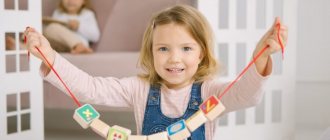For many parents, the day separating the first year of a child’s life from the second is a kind of milestone for summing up the results. They closely analyze the achievements of their children’s peers, comparing them with what their child can do and are worried if they notice a lag behind the norm. Of particular concern is the fact that a child does not speak at one year of age.
Let's figure it out, is it really important to worry if a child hasn't uttered a word in a year? When should you worry about speech delay? What can be done in advance to ensure that a one-year-old baby’s speech corresponds to the norm?
Between normality and pathology
No one needs to prove the importance of timely mastery of their native speech. This is a complex, multifaceted process directly related to various mental functions: attention, thinking, memory and speech. They expect the first words from a one-year-old baby, but he cannot even say “dad” and “mama”, he babbles in his own language and is not going to learn new words.
Alarmed parents begin to study family history, turn to doctors for advice and do their best to speed up the speech development of the baby.
A one-year-old child is able to pronounce from 3 to 12 words, but in their structure they are simple, very similar to babbling. Woof-woof, beep-bee, am-am, lalya, give, dad, mom, baba, kitty, na, bang or whoop - this is the approximate vocabulary of children per year.
Each baby is individual - some develop their first word at 8–9 months, and others at 1 year 3 months, and all these are variations of the norm.
Before the appearance of the first word, the speech of a one-year-old child went through a complex path of development. The laws of the formation of children's speech do not change over time. Today, like 100–200 years ago, not a single baby begins to speak in words and sentences until he has gone through all the stages of speech development. These stages are associated with the development of the brain, articulation apparatus and hearing.
No early development method can change the laws of nature, according to which the organs of pronunciation (articulation), hearing and the central nervous system of a person develop.
If you are concerned that your baby speaks poorly, check out the main stages of pre-language development in children under one year of age:
- 1–2 months – the appearance of intonations of pleasure and displeasure in the cry;
- 1.5–3 months – humming or hooting, when children repeat after adults vowels with the sound [g] or pronounce them independently, carefully listening to the sounds they pronounce (agu);
- 4–5 months – babbling, pronunciation of similar words consisting of several identical syllables (ma-ma-ma, but this does not yet mean the word mom);
- 8–9 months – appearance of onomatopoeia (pee-pee, woof-woof) and babbling words (kuka, tata, nanny);
- 11 months – the child uses approximately ten babbling words in the correct context, correlating their pronunciation with the situation (mom, dad, dai, bibi, etc.).
What is considered pathology? It is still too early to make predictions about speech development at one year old, however, you should start to worry if a one-year-old baby does not understand simple verbal instructions that are not supported by gestures. For example, “Give me the ball”, “Show me where the car is”, etc. Lack of response to an adult's words may be a symptom of hearing impairment or its complete absence. In this case, speech stops at the humming stage, because the child has nothing to relate his own babble to.
If urgent measures are not taken at this stage, it will be very difficult to stimulate speech development in the future. It is important to promptly contact an otolaryngologist for a hearing test. Perhaps, in case of pathologies of the inner ear, the doctor will consider it necessary for the child to wear a hearing aid. In case of serious hearing deviations from the norm, this is the only opportunity to develop and maintain speech.
Why doesn't a child speak at two years old?
20.02.2020
According to statistics, every fourteenth child in the world has clear signs of delayed speech development . However, if you, as a parent, are tormented by the question of why your child does not speak at 2 years old and where to look for the reasons, do not rush to panic prematurely. Remember that all children are individual in their own way, and each of them goes through their own special path of development. Therefore, it is not always correct to draw an analogy between the development of your child and other children of the same age.
Why doesn't the child speak?
There are several main reasons for poor verbal development of a child:
- social – the situation and environment in which the baby grows up;
- physiological – health problems in the baby.
Social reasons for a child’s poor verbal development appear when parents talk too little or don’t talk to the baby at all.
Often silent mothers and children begin to speak late.
In this case, parents are advised to pay more attention to the baby, talk to him, read fairy tales. To teach your child to speak at two years old, when communicating with him, try to name the objects around you. Do not speak too quickly and pronounce all words clearly.
The social reason why a child does not speak at two years old can be attributed to the too noisy atmosphere around him. If there is extraneous noise, the TV is constantly playing loudly, adults communicate with each other in raised tones, while no one pays attention to the baby, then the baby’s need to talk disappears. As a rule, such children begin to speak quite late, often using phrases from cartoons, without understanding the meaning of the spoken words.
If you have a situation similar to the one described above, and the child does not want to talk at two years old, you will have to try to ensure that calm reigns in the house. Avoid unnecessary fuss and noise. At the same time, remember that a TV-computer will never replace a little bit of live communication. When talking to your baby, try to interest him, thereby encouraging him to communicate.
Parents of bilingual children often encounter a problem when a child speaks poorly at two years old. In this case, the baby’s slow verbal development is explained by the fact that the baby has to learn both languages at once, being at a loss as to which of the two he should focus on.
Excessive demands from family members on the child lead to similar problems. You should not scrupulously teach your child to pronounce all the words correctly, so as not to discourage conversations in general. Parents are advised to refrain from a didactic style of speech when raising their child.
Similar problems with poor verbal development also arise in children whose parents are overly protective, trying to predict the child’s every desire. If mom already “understands without words,” why waste extra energy on mastering speech ?
Physiological reasons why a child does not speak at two years old include:
- underdevelopment of the articulatory apparatus;
- hearing impairment ;
- visual impairment ;
- stress, fear;
- brain damage .
As a rule, physiological causes can be detected before the baby reaches two years of age. Thus, a healthy baby at four months periodically smiles, hums, and pays attention to sound signals. A healthy baby at this age has a revitalization complex (vigorous movements of arms and legs).
At nine months, the baby should already show interest in musical toys. If there are no such signs, it makes sense to show the baby to the doctor . Moreover, in order to prevent the problem from worsening, you should not delay going to the pediatrician : the sooner you start treatment, the greater the chance that this situation will be eliminated, and the child will subsequently be able to do well in school.
So, we looked at the reasons why a child does not speak at 2 years old. All you have to do is determine what nature the problem is: social or physiological. Next, depending on the nature of the problem, you need to either contact pediatricians , or start with yourself: take care of the baby, communicate with him on various topics, read interesting fairy tales and children's poems to him. This will force the baby to remember new words and even sentences, which he will later be able to pronounce.
Published in Defectology Premium Clinic
Possible reasons for delayed speech appearance per year
If the baby is completely healthy, there is no history of neurological diseases, but speech has not appeared at one year, most likely the reason for the delay is in an improperly organized speech environment.
What is meant by this term? It would seem that modern children are surrounded by a real stream of speech: TV, radio, cartoons, audio books and educational games for the youngest children. And parents talk a lot with their children.
The fact is that young children are not able to isolate individual words from a stream of speech. If no special purposeful work is carried out, this flow for a child sounds approximately the same as the sound of a waterfall sounds for us.
Today, speech games (Magpie-Crow, Ladushki), nursery rhymes, pestushki, songs, sayings, previously known in every family, have disappeared from everyday life. These unique simulators gently introduced the baby into the world of native speech. They were adapted to the needs of a child up to one year old, contained onomatopoeia, and were understandable to children.
Another factor in the “nutrient” environment for the development of children’s speech is communication with the mother. A silent mother or a mother who talks on the phone more often than with her own baby will not be able to replace the value of communication, which forms the speech structures of the brain, with the best educational games.
“Mowgli’s children”, “hospitalism” - all these terms denote a delay in the appearance of speech in healthy children who are deprived of the opportunity to communicate with loved ones due to their absence.
Does your child have a speech delay?
Speech is the most important psychological process formed in the first years of life. The process of speech development is always individual and is influenced by many factors: brain activity, gender of the child (boys begin to speak much later than girls), physiology, social environment, psychological connection with the mother.
Causes of delayed speech development
This delay may be genetically determined. In this case, the nerve cells that are responsible for speech mature at a slower pace. Do not forget about diseases and lesions of the brain (various injuries, hypoxia, infectious diseases that were suffered in the womb, during childbirth or in the first year of life).
Another reason for its appearance is hearing impairment. The formation of speech occurs on the basis of what is heard, and if the baby has hearing problems, then difficulties naturally arise with reproducing words, that is, with speech itself.
What requires close attention?
-Make sure that the child makes a variety of sounds in his first 8 months, for example, “mm-mm”, “ah-ah”. If the baby continues to stubbornly remain silent, it is necessary to promptly seek advice from a neurologist.
-At the age of 10-14 months, the baby should understand the words addressed to him. If the child does not turn around when asked, and also uses crying to attract attention to himself, you should consult a specialist.
- Babies aged 14-18 months should recognize objects by ear and show them in the picture (“show the bear”, “where is the nose?”, “show the doll”). At the age of 18-24 months, the baby must satisfy the requests of adults (“bring me a ball”, “pick up the cube and give it to dad”).
-Children 2-3 years old are required to pronounce individual words and form phrases (“I want to go for a walk”, “mom let me”)-
- Older children, at the age of 3-4 years, should be able to pronounce whole sentences, which include a subject, predicate and object (“dad went to the store”, “we are going for a walk”). Particular attention should be paid if the baby pronounces most of the sounds incorrectly, if a 4-year-old child cannot form such sentences.
Diagnosis and treatment
A delay in speech development can be diagnosed in the period when speech should already be developed, namely at 3-4 years of age. Often, specialists make such a diagnosis at a time when the opportunity to catch up or correct this condition has already been missed. Therefore, parents should not wait until the baby begins to speak on his own and carefully monitor the development of his speech, starting from a very early age, especially if there are indications for this (fetal development problems, difficult childbirth, neurological indications).
A child is given such a diagnosis only on the basis of a comprehensive report from a neurologist, speech therapist, and audiologist.
If the problem is neurological, and the delay in speech development occurs as a result of brain dysfunction, treatment should be prescribed by a neurologist to improve blood circulation in the brain and support integrative brain function. If the baby has a delay in speech development due to hearing impairment or deafness, other specialists should join in.
The Regional Consultative and Diagnostic Center has doctors who are ready to help. Your child can undergo examination at a time convenient for you as part of the “Delayed speech development in a child” program, which includes a consultation with a neurologist, audiologist, speech therapist, pediatrician, an electroencephalogram, and all necessary tests.
share information
0
Social buttons for Joomla










